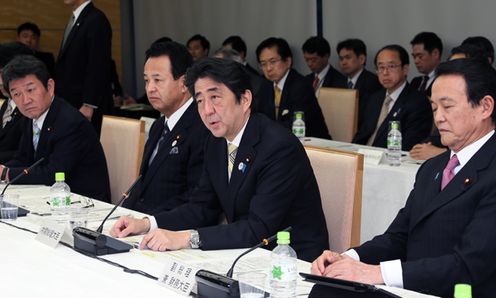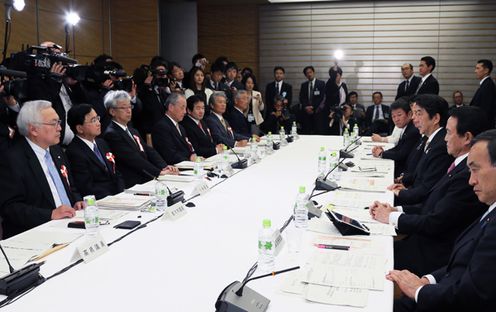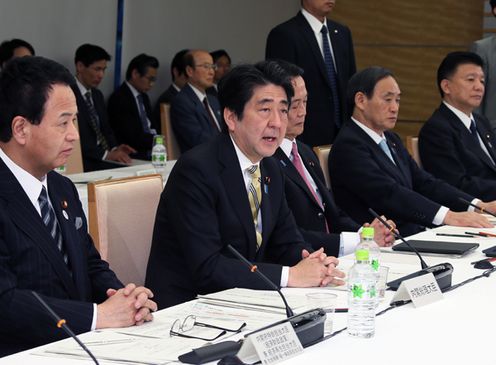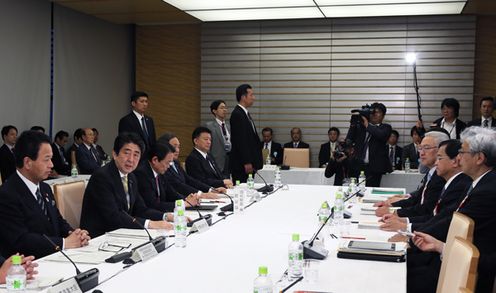Home > News > The Prime Minister in Action > April 2014 > Meeting of the Council on Economic and Fiscal Policy and Joint Meeting of the Council on Economic and Fiscal Policy and the Industrial Competitiveness Council
Meeting of the Council on Economic and Fiscal Policy and Joint Meeting of the Council on Economic and Fiscal Policy and the Industrial Competitiveness Council
Tuesday, April 22, 2014

Photograph of the Prime Minister delivering an address at the joint meeting of the Council on Economic and Fiscal Policy and the Industrial Competitiveness Council (1)

Photograph of the Prime Minister delivering an address at the joint meeting of the Council on Economic and Fiscal Policy and the Industrial Competitiveness Council (2)

Photograph of the Prime Minister delivering an address at the meeting of the Council on Economic and Fiscal Policy (1)

Photograph of the Prime Minister delivering an address at the meeting of the Council on Economic and Fiscal Policy (2)
Prime Minister Shinzo Abe held the sixth meeting of the Council on Economic and Fiscal Policy, and the fourth joint meeting of the Council on Economic and Fiscal Policy and the Industrial Competitiveness Council of 2014, at the Prime Minister's Office.
Firstly, during the joint meeting of the Council on Economic and Fiscal Policy and the Industrial Competitiveness Council, discussion took place on "strategic challenges relating to the workforce and the ways that people work." During the meeting of the Council on Economic and Fiscal Policy that followed, discussion took place on "the prioritization and streamlining of expenditure in social security."
Based on the discussion during the joint meeting of the Council on Economic and Fiscal Policy and the Industrial Competitiveness Council, the Prime Minister said in his address,
“In order to ensure the sustainability of the winds of wage hikes that have begun to blow, we must increase productivity through growth strategies, including labor market reform. In addition, we have to ensure that this leads to a continuous increase in wages and income. I would like for both employers and employees to share this recognition, work hard together, and realize a positive cycle. The Government will make every effort to create the necessary environment to facilitate these efforts.
In order to realize sustainable growth even while the population shrinks, I hope to realize a flexible way of working that allows all members of the public to achieve their full potential, regardless of whether they are young or old, male or female.
First, the strengthening of measures to prevent overworking are prerequisites for efforts to this end. Therefore, we need to diversify regulations regarding working hours to account for a variety of situations and diverse needs, including for childrearing and nursing care. I would like you to consider a new scheme for the system for working hours that is suited to a work style that prizes results over time worked, and that enables people to exercise their creativity while looking after their own health.
In addition, I would like for this meeting to advance discussion on the creation of an objective and highly transparent scheme that facilitates the resolution of labor disputes so that the public can select a workplace with peace of mind, including in small- and medium-sized enterprises (SMEs), and so that businesses too can create employment opportunities with peace of mind.”
Later, based on the discussion during the meeting of the Council on Economic and Fiscal Policy, the Prime Minister said in his address,
“We have received a concrete proposal from private sector members toward the further enhancement and streamlining of social security benefits, covering such issues as the restructuring of hospitals; healthcare and nursing care reimbursements, including pharmaceutical prices; and public assistance. I would like for you to continue to deepen discussion within this Council, and to create basic policies in order to stabilize social security and fully pass it onto the next generation.
Additionally, as outlined in the proposal from Minister Aso and elsewhere, I would like the Minister in charge of Total Reform of Social Security and Tax to cooperate with the relevant ministers and utilize the insights of the experts to advance discussion toward giving shape to the adoption of ICT for the management of cross-regional medical and nursing care information, including the issue of the ideal standards for medical care expenses nationally and in each prefecture.”



